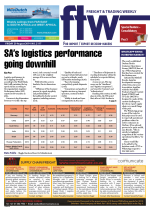Bribery at border posts is a
catch-22 situation for transport
operators – if they pay, they get
their trucks and goods cleared
more quickly. However, the
next time they reach the same
border post, the price of a bribe
will have doubled. If they don’t
pay, they can claim the moral
high ground, but they are then
guaranteed an indefinite delay
at a border post or a road block
and may lose a client if they
don’t make a tight delivery
deadline.
The problem
A small transport operator
told FTW it was the only way
he could retain a competitive
edge in an increasingly ratesdriven
business. “If my drivers
don’t pay, there is inevitably
some reason why the truck or
goods cannot be cleared and
then the trucks often have
to spend a night or two at a
border post where the drivers
and goods are vulnerable to
other criminal elements such
as robbery and even assault,”
he said, adding that the price of
a bribe was then often a much
lower short-term “cost”.
Another person mentioned
his brother, a single operator
running a 35-ton truck from
South Africa to Zimbabwe,
Malawi and Zambia. “As a
matter of course, he carries
a pile of R20 notes as bribes
to pay uniformed people
who appear out of nowhere
and claim the truck is
unroadworthy and is subject to
fines running into thousands
of rands. He simply pays
R40 or R60 to ensure he can
continue his journey.” A round
trip to Malawi from South
Africa could cost an average
of R1 000 to R2 000 in bribes
(over and above the border gate
bribes).
A transporter said the wartorn
Democratic Republic of
Congo (DRC) was the worst
offender as all the authorities
seemed to be involved in
some way. “The selling of
receipts in the DRC is also
now a lucrative business where
drivers can buy a receipt for
‘something’ and offer it as
proof to transport company
owners.” The operator told
FTW that this was difficult to
pin down as rules within the
Southern African Development
Community (SADC) countries
changed so often, with little
or no notice, that the receipts
could well be legitimate.
She said that driver
involvement was a major
problem as they often claimed
for bribes that were not
applicable. “We ask them to
obtain receipts so we have
recourse to fight the issue with
the local authorities but often
these are refused or they buy
false receipts.”
Cross-border transporters
often have to push up their
rates to compensate for delays
because of unpaid bribes or
to cover the expense of having
to pay a bribe but meet the
delivery schedule, said another
operator.
The solution?
Cutting off the head of the
snake and simply not paying
is the answer, say some.
But this would only work if
everyone worked collectively
to do so, otherwise just like
the mythical Greek hydra, the
snake will continue to grow
more heads. “Social problems
such as high unemployment
have certainly contributed
to this as it is considered less
risky and certainly easier than
a robbery,” noted a clearing
agent.
One operator said: “The
issue is, who is involved? Is it
just one department or the
whole system? Then, we also
need to determine which
border posts have the worst
offenders and start to crack
down on them first – either
through sting operations or
legal recourse.” He believes
that the problem is that the
industry usually talks around
the issue but no-one really
talks specifics as they are
worried about reprisals.
A transporter mentioned
that Botswana was one of
the few SADC countries
where operators could lodge
complaints around bribery
and corruption practices
and the authorities actually
took action. She noted that
the mining and other global
companies – that transport
large cargo volumes through
Africa – have corporate
policies in place to deal with
bribery and corruption and
will often assist their logistics
suppliers to deal with issues
that arise. “Having a good,
honest and open relationship
with your client does make a
difference.” She added that
the flip side of this was that
despite the policies, often the
client’s own employees were
involved and would demand
bribes for trucks to be loaded
faster or even let through the
gates.
Another operator noted that
their solution was simply not
to let drivers travel with large
amounts of cash but rather
with value items such as cool
drinks, cigarettes or canned
goods. “It is a more affordable
and fairer option.”
Navigating the bribery maze
29 Aug 2014 - by Adele Mackenzie
0 Comments
FTW - 29 Aug 14

29 Aug 2014
29 Aug 2014
29 Aug 2014
29 Aug 2014
29 Aug 2014
29 Aug 2014
29 Aug 2014
29 Aug 2014
29 Aug 2014
29 Aug 2014
29 Aug 2014
Border Beat
Featured Jobs
New
